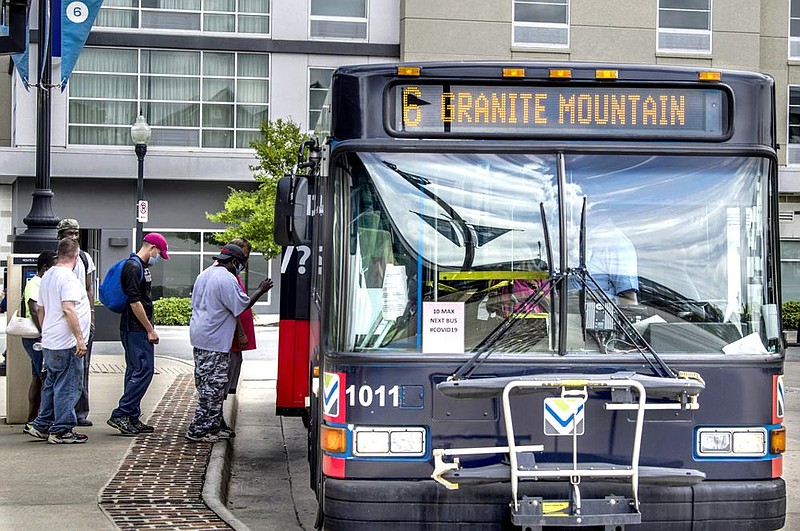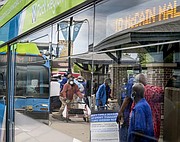After suspending fare collections for more than 2½ months because of the coronavirus outbreak, Rock Region Metro will reinstate bus fares and front-of-bus boarding starting today, albeit with a grace period of several days.
Riders will need to buy passes in order to board beginning Monday.
As part of Rock Region Metro’s efforts to slow the spread of covid-19, fare collections were suspended, and passengers have been using the rear doors of the buses since April to maintain distance between bus drivers and riders.
The reinstated fares follow another month of low ridership for the Pulaski County transit agency. The number of passengers on Rock Region Metro bus routes fell nearly by half in May compared with the same time last year, according to figures provided Tuesday during a meeting of the transit agency’s board of directors.
The agency’s staff reported that amid route suspensions and social-distancing measures prompted by the pandemic, May’s ridership dropped by 48% compared with May last year. The number of passengers fell from 193,788 in May 2019 to 101,630 this May.
Although he said audited numbers for this month aren’t yet available, Rock Region Metro Executive Director Charles Frazier expects a similar decline in ridership for June as compared with last year.
“This is particularly frustrating for us because we were one of the few transit agencies in the nation that actually saw an increase in ridership in 2019,” he wrote in an email to the Arkansas Democrat-Gazette after Tuesday’s board meeting. “The covid-19 pandemic has really impacted our ridership.”
Rock Region ridership also plummeted between March and April this year, with the number of passengers reportedly decreasing from 163,551 to 108,689.
April’s ridership represented a 44% decline compared with the previous year. Overall ridership this year is down 19% compared with last year, according to the agency’s numbers.
The transit agency cut multiple routes, suspended streetcar service and placed passenger restrictions on individual buses beginning in March in response to the coronavirus outbreak.
Becca Green, a spokeswoman for Rock Region Metro, said the agency has installed sneeze guards at the fronts of buses where the fare boxes are located to help protect drivers.
The agency also is encouraging riders who want to take advantage of a contactless payment system using their smartphones to purchase passes through the Token Transit app.
During the period when fare enforcement was temporarily suspended, riders could still buy passes online and through a smartphone app as a way to contribute to what is ordinarily a major revenue source for the agency.
When Rock Region Metro suspended fare collections enforcement April 1, Frazier said he expected lost revenue to total as much as $5,000 per day.
The agency’s financial report for May reflects that decision. Last month, the agency collected just $1,568.35 in terms of operating revenue, according to the report. The agency had budgeted for $155,392.99.
Helping prop up the agency’s finances is a $15 million grant under the federal coronavirus relief package that Congress passed in March.
Also, some employees with the transit agency are returning to work after being laid off.
Of the 23 Rock Region Metro employees laid off in May, Frazier told board members Tuesday that the agency has brought back eight and will bring back an additional two next week.
“We hope to have the remainder of all employees back before the end of September,” Frazier said at the meeting. “And quicker, if possible.”
Mandatory face coverings while passengers are on the buses and cleaning efforts will continue, Frazier told board members.
Board members also approved spending more than $80,770 on four 2020 Dodge Grand Caravans, a type of minivan, for use by Rock Region street supervisors.
The purchase is intended to replace three 2013 vans and one 2015 van that are past their useful life, according to the agency.

